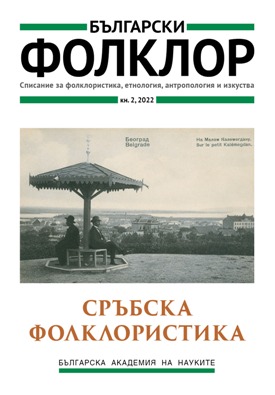Непокорният юнак в южнославянските епически песни и руските билини
A Disobedient Hero in South Slavic Epic Poems and Russian Bylines
Author(s): Danijela PetkovićSubject(s): History, Anthropology, Social Sciences, Language and Literature Studies, Literary Texts, Cultural history, Semiotics / Semiology, Customs / Folklore, Poetry, Anthology, Theoretical Linguistics, Applied Linguistics, Studies of Literature, Sociology, Ethnohistory, History of ideas, Oral history, Social history, Theology and Religion, Sociolinguistics, Comparative Study of Literature, Cultural Anthropology / Ethnology, Culture and social structure , Social differentiation, Sociology of Culture, Sociology of the arts, business, education, Philology, Social Norms / Social Control, History of Religion, Identity of Collectives, Stylistics
Published by: Институт за етнология и фолклористика с Етнографски музей при БАН
Keywords: disobedient hero; South Slavic epic poems; bylines; heroic and magical principle
Summary/Abstract: This paper explores the position of the rebellious, disobedient hero in his own environment on the examples of South Slavic and Russian epics; more precisely, it explores the hero’s disobedience to an authority from his social or family domain. There is a collision between the heroic status of the hero, emphasizing disobedience, independence and pride, with his social and family status, which lowers the hero on the hierarchical ladder. The hero opposes the will of his superior and sometimes explicitly shows his defiance through special gestures, specific gait or riding, often in the same way as his enemy, but unlike the enemy’s, his arrogance and daring are not always punished. An insubordinate hero is not a frequent type, although often a young hero and a neophyte. Besides, disobedience is not reserved for one and the same characters, although the most disobedient heroes are the greatest Russian hero Ilja Muromec and the greatest South Slavic hero Marko Kraljević. Disobedience is only partially a means of the heroes’ characterization, it is mainly used as a motivation, as an element of the commencement that, through the initial collision, opens the possibility for different variants of the plot, in which, in most poems, the epic prevails over the balladic resolution, the heroism over the punishment for hybris, the heroic over the magical principle.
Journal: Български фолклор
- Issue Year: XLVIII/2022
- Issue No: 2
- Page Range: 150-169
- Page Count: 20
- Language: Bulgarian
- Content File-PDF

